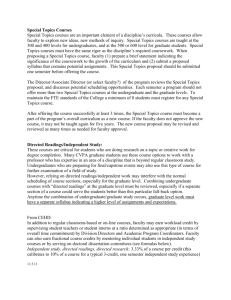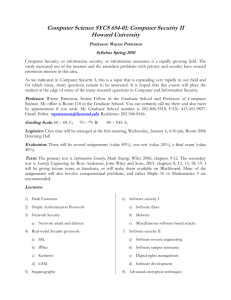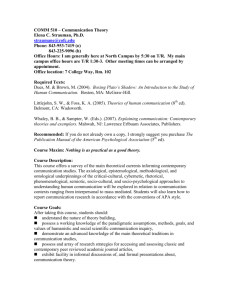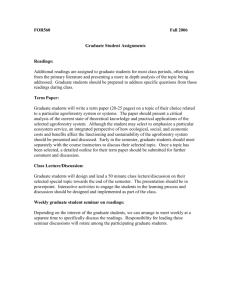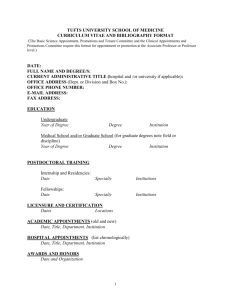SWK610 Advanced Social Work Practice with Families Global
advertisement
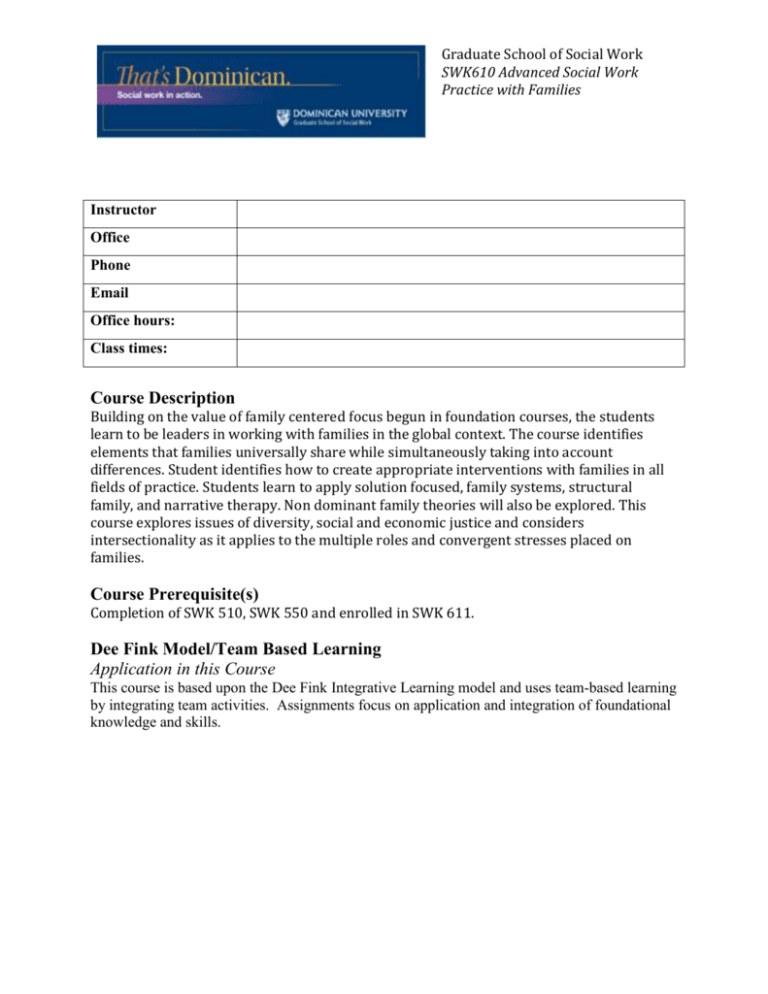
Graduate School of Social Work SWK610 Advanced Social Work Practice with Families Instructor Office Phone Email Office hours: Class times: Course Description Building on the value of family centered focus begun in foundation courses, the students learn to be leaders in working with families in the global context. The course identifies elements that families universally share while simultaneously taking into account differences. Student identifies how to create appropriate interventions with families in all fields of practice. Students learn to apply solution focused, family systems, structural family, and narrative therapy. Non dominant family theories will also be explored. This course explores issues of diversity, social and economic justice and considers intersectionality as it applies to the multiple roles and convergent stresses placed on families. Course Prerequisite(s) Completion of SWK 510, SWK 550 and enrolled in SWK 611. Dee Fink Model/Team Based Learning Application in this Course This course is based upon the Dee Fink Integrative Learning model and uses team-based learning by integrating team activities. Assignments focus on application and integration of foundational knowledge and skills. Graduate School of Social Work SWK610 Advanced Social Work Practice with Families CSWE Competency Outcomes Addressed in the course CSWE Competencies EP2.1.1 Identify as a Professional Social Worker EP 2.1.2 Apply Social Work Ethical Principles EP 2.1.3 Apply Critical Thinking Associated Practice Behaviors Session Covered Critiques and analyzes interventions, 2–13 program implementation, and policy formulation processes to ensure that individual and community voices most 1–15 often missing will be heard (ADV) Assignments Measuring Practice Behaviors Exploration of Personal Family Paper Family Unit Relationship Role-play and Assessment Paper an advanced 2, 3, 9 understanding of ethical principles and incorporates them into action to advance human rights, social justice and well-being (ADV) Families and Ethics Case Study Critically evaluates the strengths and 2-14 limitations of multiple practice perspectives, theories, and models as they apply to practice with individuals, families, and communities in a global context (ADV) Comparative Assessment of Family Theories Paper a. Demonstrate Family Unit Relationship Role-play and Assessment Paper Intervention Case Study Quizzes EP 2.1.4 Engage Diversity and Difference in Practice Utilize social work practice that is grounded in principles of inclusion, collaboration, and participation and is reflective of diversity and difference. (ADV) 2, 3, 9 Families and Ethics Case Study Graduate School of Social Work SWK610 Advanced Social Work Practice with Families CSWE Competencies EP 2.1.10 b, c Assessment Associated Practice Behaviors Session Covered Assignments Measuring Practice Behaviors Continue to learn about, recognize, 2–14 understand, communicate, and work to change the structural and social injustice that impacts the realities for different people, families and communities with whom they work as informants and partners (ADV) Diverse Population Interviews and Reflection Paper (inclass) Collaborates with individuals, 2, 3, 9 families and community to assess factors that may include political, economic, and cultural influences and embedded racial and gender intolerance to better interpret existing structural barriers and supports when planning strategies to solve problems (ADV) Exploration of Personal Family Paper Assesses the impact of spirituality and 2–5 faith traditions as a historical and cultural influence for individuals, families, groups, and communities’ well-being (ADV). Diverse Population Interviews and Reflection Paper (inclass) Graduate School of Social Work SWK610 Advanced Social Work Practice with Families Course Learning Objectives Reflected in Significant Learning Types Course Learning Objectives Significant Learning Type Students will explain key theories utilized for practice with family Conduct family-centered assessments and make decisions about appropriate interventions. Compare traditional with postmodern/indigenous family practice models/theories Foundational knowledge Application Integration Relate the use of a particular theoretical or practice approach to a particular client need. Understand one’s own family and families of others in the context of their unique history and culture including experiences of oppression and marginalization Human Dimension Be excited about the lived experiences of families, as defined by its members Caring Create a plan for monitoring and addressing the impact of one’s own family’s history on one’s practice. Learning How to Learn Identify resources for information on the ethical challenges of family practice. Methods of Instruction This course will be taught in the form of guided discussion, team activities and lectures. Required Course Readings Rasheed, J. M., Rasheed, M. N., & Marley, J. A. (2011) Family therapy: Models and techniques. Thousand Oaks, CA: Sage. Graduate School of Social Work SWK610 Advanced Social Work Practice with Families McGoldrick, M., Giordano, J. & Pearce, J. (Eds.) (2005). Ethnicity and family therapy. New York: Guilford Press. Course Policies A complete list of course policies can be found in the Student Handbook located online. Please click on the link listed below: http://dushare.dom.edu/gssw/students/ Grading Policy Grading will follow the Dominican University Graduate School of Social Work grading system (current MSW Student Handbook) with percentage marks associated with corresponding letter grades. Grade A AB+ B BC+ C CF Grade Point Value 4.0 (96-100%) 3.67 (92-95%) 3.5 (88-91%) 3.0 (84-87%) 2.67 (80-83%) 2.5 (76-79%) 2.0 (72-75%) 1.67 (68-71%) 0 (below 68%) Description Excellent Standard Attendance Policy Students are expected to attend and participate in all class meetings. One absence is acceptable. Absences will affect the final grade as follows: One Absence: make up the work (Work assigned in class on that day will need to be made up within 2 weeks.) Two Absences: 5% will be deducted from the final grade (After the second absence you should make an appointment with the professor to discuss your progress in the course and any difficulties you may be having.) Graduate School of Social Work SWK610 Advanced Social Work Practice with Families Three Absences: 10% will be deducted from the final grade (The student should consider withdrawing from the class.) Four Absences: The student will receive an F for the course. (If a student misses 4 or more classes per semester, it is recommended that the student withdraw from the course). Attendance Means: The student is present at the beginning of the class. Professional behavior is expected of all students in the classroom. When students leave class during the class it disrupts the learning process. We will have a 15-minute break midway through the class. Excessive Lateness: (more than 15 minutes late) Arriving late for class 1-2 times will be overlooked. Please be on time. Students who arrive late unintentionally disrupt the learning process. Excessive lateness will have an impact on the attendance and participation portion of the grade. Academic Dishonesty and Integrity All students of the GSSW are expected to observe high standards of academic honesty and integrity. Any student whose conduct violates such standards may be subject to disciplinary action as determined by due process. Plagiarism Students are expected to follow the guidelines of the American Psychological Association Publication (APA) Manual 6th Ed. All major assignments are to be uploaded to SafeAssign or Turn-It-In via Canvas to check for Plagiarism. Plagiarism is presenting material from any source as one’s own without proper attribution, which is to include the use of quotation marks when another’s exact wording is used and proper citation when another’s ideas are used but exact wording is not used. Any material other than one’s own that is used in a paper must be properly cited in order to avoid the plagiarism of another’s work. Plagiarism is grounds for a grade of F on the assignment and will be referred to the Dean or Assistant Dean for further disciplinary action. A student suspected of cheating or plagiarism will receive an automatic F for that particular paper, assignment or exam. A written incident report will be sent to the Dean/Assistant Dean. A Student is given a waiver to one offense of Plagiarism. He or she must meet with their academic advisor and develop a plan for resolution. If the student offends a second time they will be referred to the Dean for further disciplinary action and possible dismissal. If the student is dismissed he or she will wait two years for re application to Dominican GSSW. Student must sign Plagiarism Pledge in order to graduate. Graduate School of Social Work SWK610 Advanced Social Work Practice with Families ADA Compliance Students with disabilities may request special accommodation. Students with special disabilities must provide the professor with a copy of the verification of the disability from the Office of the Dean of Students, Trudy Goggin, by the second week of class in order to receive special accommodations. The Writing Center also provides services to students who need additional reading, writing or computer skills: 708-524-6682. For more information click on the following link: Disability Support Services Course Requirements # Assignments Associated Practice Behavior Possible Points Due Date 1 Families and Ethics Case Study 2.1.2b, e (ADV) 5 Session 3 2 Diverse Population Interviews and Reflection Paper (inclass) 2.1.4 (ADV) 10 Session 6 3 Quizzes (3) 2.1.3 (ADV) 5 each Session 3 Session 8 Session 11 4 Family Unit Relationship 2.1.1 (ADV) Role-play 2.1.3 (ADV) 5 Exploration of Personal Family Paper 2.1.10b (ADV) 20 Session 10 6 2.1.3 (ADV) 20 Session 13 7 Comparative Assessment of Family Theories Papers Intervention Case Study 2.1.3 (ADV) 2.1.10 (ADV) 10 Session 14 8 Peer Evaluations N/A Sessions 8 - 10 Session 7 Session 14 Graduate School of Social Work SWK610 Advanced Social Work Practice with Families Total 100 Description of Assignments 1. Families and Ethics Case Study This team activity will ask students to read a family case study and assess the ethical challenges of the case. Each team will integrate course readings and, a) define the ethical challenges; b) present a minimum of two interventions to address the ethical challenge. Each team will present their work during class and explain their rationale for their completed work. 2. Diverse Population Interviews and Reflection Paper (in-Class) Students will meet with “class guests” and spend 15 – 20 minutes learning about different family experiences. The interviews may be completed one-to-one or have one “guest” interviewed by 2 or 3 students. Each student will participate in a minimum of 2 interviews. After the interviews students will write a reflection on the lived experience of different family compositions, focusing on a range of cultural expressions, including relationship style, communication style, approach to spirituality, etc.. This 3-page reflection will demonstrate an understanding of “self” and how the interviews impacted the student’s understanding of their own family and also what was learned about different families. 3. Quizzes Students will complete 3 quizzes over the semester demonstrating an understanding of the concepts and theories utilized for practice with families. The quizzes will strongly incorporate information from the readings. 4. Family Unit Relationship Role-Play Students will complete a 10-minute role-play in the social worker role with their assigned team. Each student is responsible for presenting the specific setting for their family meeting. Team members will role-play different family members for each student roleplay. Focus of this role-play is on relationship development with the family unit. Team members will offer feedback on the student’s skills during the role-play. Each student will complete a two-page reflection paper on their assessment of their strengths in the role-play. Student will also discuss areas where further development is needed in work with families. 5. Exploration of Personal Family Paper Graduate School of Social Work SWK610 Advanced Social Work Practice with Families The purpose of this paper is for the student to gain insight and to critically assess their strengths and potential biases in working with individuals and families based on their own family dynamics and to develop a plan for dealing with the challenges. This narrative paper consists of two parts: 1) assessment, and 2) analysis and discussion: Part 1: Assessment Part 1 includes a family genogram (minimum of 3 generations), ecomap and answers to instructor provided questions. Part 2: Processing, Discussion and Analysis In this section of the paper, use critical thinking and reflective thinking skills by 1) raising and formulating important questions and concerns clearly and precisely; 2) gathering and assessing important information, using and interpreting abstract ideas effectively; 3) drawing rational conclusions and solutions and testing them to ensure appropriateness 4) and thinking open-mindedly about alternative systems recognizing, assessing the assumptions, implications and practical consequences 5) communicating effectively by finding solutions to complex problems. In other words, what does the assessment (genogram and ecomap), family background and history mean for you as a future social worker? Through critically reflecting on your own events and situations, you also learn about families. You will learn about family dynamics, belief systems, behaviors and relationships and the diversity of ideas and outcomes when applying the family assessment process. It is intended to help you examine yourself and reflect on how values, beliefs, rules, rituals and traditions in your own family shape your behavior and thinking as a social worker. Continue to process and evaluate your increased awareness gained by this assignment. Identify your level of self-awareness and its role in helping you to be a better social worker. With this awareness, identify and describe the 3 biggest challenges that family work may present for you. What do you envision as the most difficult aspect of working with families? Why? What problems or ethical dilemmas are you worried about encountering? What strengths will you bring to your work based upon your own family experiences? What is your plan as a social worker for dealing with these areas that are a challenge to you? This section is crucial to your paper as it involves a level of critical thinking that is important to your practice. Be sure to take the time to evaluate in depth the challenges and issues of counter transference that you will have for you as a social worker. Part 3: Application of Theory End your paper with 1-2 pages describing how one of the Family Therapy approaches helps you to understand your own family dynamics. Make sure you cite and quote the reading in your analysis Graduate School of Social Work SWK610 Advanced Social Work Practice with Families 6. Comparative Assessment of Family Theories Paper Students will complete a paper comparing a psychodynamic theory (attachment theory, object relations family therapy) and post-modern approach (narrative family therapy, solution focused therapy, oppression theory). Part I: Description of theories Part II: Selection of a specific stressful event, crisis or trauma experienced by a family. Part III: Integration of the two family model interventions and approach to the event chosen in Part II. The student will include discussion of oppression and privilege on the family. 7. Intervention Case Study This team activity will comprises a case study to each team. Teams will review the case and discuss the different family therapy models presented in class and the readings. The team will then choose which therapy model is most appropriate for the family in the case study. Teams will then present and offer their rationale for this decision to the full class. 8. Peer Evaluations At two times during the semester (midterm and final week) students will evaluate the other students in their team. This evaluation be completed on a structured evaluation form and include both quantitative and qualitative feedback. Students will be asked to offer both positive feedback as well as suggestions on how to grow in team activities. Graduate School of Social Work SWK610 Advanced Social Work Practice with Families Course Outline Sequence of Learning Activities Session Date In Class Topics and Activities 1 Topics: Overview of course goals Introduction to team based learning Creation of teams TBL Activities: Team project: Team “rules” View first sessions of “The Legacy of Unresolved Loss” Out of Class Work/Readings: Rasheed, Rasheed, & Marley (2011). Chapter 1: The History of Family Therapy: Conceptual and Clinical Influences Prosky, P. (2003). Family therapy east and west. American Journal of Orthopsychiatry, 73(2), 230-234. Beels, C.C. (2002). Notes for a cultural history of family therapy. Family Process, 41(1), 67-82. Assignments Due: None 2 Topics: Family Assessment Review of using Ecomaps and Genograms Ethnicity and Family Therapy TBL Activities: Continue viewing “Unresolved Loss” Graduate School of Social Work SWK610 Advanced Social Work Practice with Families Out of Class Work/Readings: Rasheed, Rasheed, & Marley (2011). Chapter 3: Ethnicity and Family Life McGoldrick, Giordano, & Garcia-Preto (2011). Chapter 1: Overview: Ethnicity and Family Therapy Butler, J. F. (2008). The family diagram and genogram: Comparisons and contrasts. American Journal of Family Therapy, 36(3), 169-180. doi:10.1080/01926180701291055 Kosutic, I., Garcia, M., Graves, T., Barnett, F., Hall, J., Haley, E., & ... Kaiser, B. (2009). The critical genogram: A tool for promoting critical consciousness. Journal of Feminist Family Therapy, 21(3), 151-176. doi:10.1080/08952830903079037 Assignments Due: None 3 Topics: Systems Theory and Family Therapy The Family Life Cycle Families of African Origin TBL Activities: Quiz 1 Families and Ethics Case Study Out of Class Work/Readings: Rasheed, Rasheed, & Marley (2011). Chapter 2: The Ecology of Families: A Systems/Developmental Perspective Barsky, A. (2010). Chap 6: Practice, Values, and Ethics – Social Work with Families, pp 119 – 130. Graduate School of Social Work SWK610 Advanced Social Work Practice with Families McGoldrick, Giordano, Garcia-Preto (2011). Chapter 5: Families of African Origin: An Overview Recommended: Chapter 6: African American Families Chapter 7: African Immigrant Families Assignments Due: *See TBL Activities 4 Topics: Psychodynamic Models Object Relations Theory and Self Psychology Historical Trauma Native American Families TBL Activities: Out of Class Work/Readings: McGoldrick, Giordano, Garcia-Preto (2011). Chapter 2: American Indian Families: An Overview Sussal, C. M. (1992). Object relations family therapy as a model for practice. Clinical Social Work Journal, 20(3), 313-321. Retrieved from EBSCOhost Brodiea, F., & Wright, J. (2002). Minding the gap not bridging the gap: Family therapy from a psychoanalytic perspective. Journal of Family Therapy, 24(2), 205. Retrieved from EBSCOhost. Van Hook, M.P. (2014). Chapter 12: Object Relations Family Therapy (pp 305 – 318) in Social Work Practice with Families: A Reliliency-Based Approach (2nd ed). Chicago: Graduate School of Social Work SWK610 Advanced Social Work Practice with Families Lyceum Books, Co. Recommended: Chapter 3: Back to the Future: An Examination of the Native American Holocaust Experience Chapter 4: Na ‘Obana: Native Hawaiian Families Assignments Due: None NO CLASS – Caritas Veritas Symposium 5 Topics: Functional Family Therapy Community Implementation of Functional Family Therapy Latino Families TBL Activities: Each team will invite a “family historian” (an older adult) who agrees to discuss family history. The team will interview this guest and then discuss how the guest’s history integrates family concepts discussed in class. Out of Class Work/Readings: Estrada, A. L. (2009). Mexican Americans and historical trauma theory: A theoretical perspective. Journal of Ethnicity in Substance Abuse, 8(3), 330-340. doi:10.1080/15332640903110500 McGoldrick, Giordano, Garcia-Preto (2005) Chapter 11: Latino Families: An Overview Recommended: Chapter 13: Central American Families Chapter 16: Dominican Families Chapter 17: Mexican Families Chapter 18: Puerto Rican Families Graduate School of Social Work SWK610 Advanced Social Work Practice with Families Assignments Due: None 6 Topics: Structural Family Therapy Applications of Structural Family Therapy Jewish Families TBL Activities: Out of Class Work/Readings: Rasheed, Rasheed, & Marley (2011). Chapter 6: Structural Family Therapy McGoldrick, Giordano, & Garcia-Preto (2005) Chapter 48: Jewish Families: An Overview Chapter 49: Israeli Families Chapter 50: Orthodox Jewish Families Chapter 51: Russian Jewish Families Assignments Due: Diverse Population Interviews and Reflection Paper (in-class) 7 Topics: Intergenerational Approaches for Family Treatment Bowenian Family Therapy Genograms & Ecomaps-Review Families of European Origin TBL Activities: Peer Evaluation Role-playing Graduate School of Social Work SWK610 Advanced Social Work Practice with Families Out of Class Work/Readings: Rasheed, Rasheed, & Marley (2011) Chapter 5: Family of Origin Family Therapy Cress & Cress Peterson. (2009). Working with Adult Aging Siblings. In Cress, C. (ed) Care Managers: Working with the Aging Family (pp. 199 – 228). Boston: Jones and Bartlett Publishers. (on Canvas) McGoldrick, Giordano, & Garcia-Preto (2005). Chapter 16: Families of European Origin: An Overview Recommended: Chapter 37: American Families with English Ancestors from the Colonial Era: Anglo Americans Chapter 41: Greek Families Chapter 42: Irish Families Chapter 44: Italian Families Assignments Due: *See TBL Activities 8 Topics: Cognitive-Behavioral Family Therapy Slavic Families TBL Activities: Quiz 2 Family Unit Relationship Role-play and Assessment Paper Out of Class Work/Readings: Rasheed, Rasheed, & Marley (2011). Chapter 9: CognitiveBehavioral Family Therapy Miller, AL, Glinski, J, Woodberry, KA, Mitchell, A, Indik, J (2002). Family Therapy and Dialectical Behavior Therapy with Graduate School of Social Work SWK610 Advanced Social Work Practice with Families Adolescents, American Journal of Psychotherapy, 56 (4), 568-584 McGoldrick, Giordano, & Garcia-Preto (2011). Chapter 52: Slavic Families: An Overview Recommended: Chapter 53: Czech and Slovak Families Chapter 54: Polish Families Assignments Due: *See TBL Activities 9 Topics: Strategic Family Therapy Asian Families TBL Activities: Role-playing Out of Class Work/Readings: Santisteban, DA (2003). Efficacy of Brief Strategic Family Therapy in Modifying Hispanic Adolescent Behavior Problems and Substance Use, Journal of Family Psychology, 17 (1), 121-133 Rasheed, Rasheed, & Marley (2011) Chapter 7: Strategic Family Therapy McGoldrick, Giordano, & Garcia-Preto (2005) Chapter 20: Asian Families: An Overview Recommended: Chapter 23: Filipino Families Chapter 26: Korean Families Assignments Due: None Graduate School of Social Work SWK610 Advanced Social Work Practice with Families 10 Topics: Solution Focused Interventions Asian Indian Families TBL Activities: Role-playing Out of Class Work/Readings: Bott, D. (2001). Towards a family-centered therapy. Postmodern developments in family therapy and the person-centered contribution, Counseling Psychology Quarterly, 14 (2), 111118. Rasheed, Rasheed, & Marley (2011) Chapter 8: Solution-Focused Family Therapy McGoldrick, Giordano, & Garcia-Preto (2005) Chapter 28: Asian Indian Families: An Overview Recommended: Chapter 29: Indian Hindu Families Chapter 30: Pakistani Families Assignments Due: Exploration of Personal Family Paper 11 Topics: Communications Approaches Open Dialogue Approach Recovery Model TBL Activities: Quiz 3 Graduate School of Social Work SWK610 Advanced Social Work Practice with Families Out of Class Work/Readings: Rasheed, Rasheed, & Marley (2011). Chapter 4: Communication/Humanistic Family Therapy Poore M. J. (2011). Chicken wing: a patient’s journey from depression to fulfillment. Journal of Participatory Medicine, 3(e19). Seikkula, J. (2008). Inner and outer voices in the present moment of family and network therapy. Journal of Family Therapy, 30, 478–491. Seikkula, J. & Olson, M. (2003). The open dialogue approach to acute psychosis: its poetics and micropolotics. Family Process. 42(3), 403-418. Adame, A. L., & Knudson, R. M. (2007). Beyond the counternarrative: Exploring alternative narratives of recovery from the psychiatric survivor movement. Narrative Inquiry, 17(2), 157-178. Retrieved from EBSCOhost. Carpenter, J. (2002). MENTAL HEALTH RECOVERY PARADIGM: Implications for Social Work. Health & Social Work, 27(2), 86. Retrieved from EBSCOhost. Assignments Due: *See TBL Activities 12 Topics: Narrative Family Interventions Middle Eastern Families TBL Activities: Graduate School of Social Work SWK610 Advanced Social Work Practice with Families Out of class work/readings: Rasheed, Rasheed, & Marley (2011) Chapter 10: Narrative Family Therapy Miller, B. J., Parra Cardona, J.R., & Hardin, M. (2006). The use of narrative therapy and internal family systems with survivors of childhood sexual abuse: Examining issues related to loss and oppression. Journal of Feminist Family Therapy, 18(4). McGoldrick, Giordano, & Garcia-Preto (2005) Chapter 31: Arab Families: An Overview Recommended: Chapter 32: Armenian Families Chapter 33: Iranian Families Chapter 34: Lebanese and Syrian Families Chapter 35: Palestinian Families Assignments Due: None 13 Topics: Clinical Issues in Family Therapy Grandparents raising grandchildren TBL Activities: Graduate School of Social Work SWK610 Advanced Social Work Practice with Families Out of Class Work/Readings: Rasheed, Rasheed, & Marley (2011). Chapter 11: Phases of Family Therapy Kropf, N. & Yoon, N. (2006). Grandparents Raising grandchildren: Who are they? In Berkman, B. (ed). Handbook of Social Work in Health and Aging (pp. 355 – 362). Oxford: Oxford University Press. Linares, J.L. (2001). Does history end with postmodernism? Toward an ultramodern family therapy, Family Process, 40 (4), 401-412. Assignments Due: Comparative Assessment of Family Theories Paper 14 Topics: Special Issues in Family Therapy The Changing Family TBL Activities: Intervention Case Study Out of Class Work/Readings: Rasheed, Rasheed, & Marley (2011). Chapter 11: Phases of Family Therapy Kropf, N. & Yoon, N. (2006). Grandparents Raising grandchildren: Who are they? In Berkman, B. (ed). Handbook of Social Work in Health and Aging (pp. 355 – 362). Oxford: Oxford University Press. Linares, J.L. (2001). Does history end with postmodernism? Toward an ultramodern family therapy, Family Process, 40 (4), 401-412. Assignments Due: Graduate School of Social Work SWK610 Advanced Social Work Practice with Families *See TBL Activities 15 Topics: Review course goals Course wrap-up TBL Activities: Final Peer Evaluation Out of Class Work/Readings: Rasheed, Rasheed, & Marley (2011). Chapter 14: Family Therapy Research: Implications for the Practicing Family Therapist Assignments Due: *See TBL Activities Graduate School of Social Work SWK610 Advanced Social Work Practice with Families Grading Rubric Graduate School of Social Work SWK610 Advanced Social Work Practice with Families Recommended Readings

